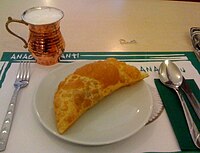Chebureki
 Çibörek and ayran in a Turkish cafe | |
| Alternative names | Çibörek, çiğ börek |
|---|---|
| Course | Main course |
| Region or state | Crimean Peninsula |
| Created by | Crimean Tatars[1] |
| Main ingredients | Lamb or beef |
| 283 kcal (1185 kJ) | |
Cheburek[a] (plural: Chebureki) are deep-fried turnovers with a filling of ground or minced meat and onions.[2] A popular street dish, they are made with a single round piece of dough folded over the filling in a crescent shape.[3] They have become widespread in the former Soviet-aligned countries of Eastern Europe in the 20th century.
Chebureki is a national dish of Crimean Tatar cuisine.[1] They are popular as a snack and street food throughout the Caucasus, West Asia, Central Asia, Lithuania, Latvia, Estonia, Ukraine, Russia, Eastern Europe,[1][3] as well as in Turkey,[4] Greece and Romania.
Preparation
A cheburek is a half-round-shaped börek, filled with a very thin layer of ground beef or lamb which has been seasoned with ground onion and black pepper.
The dough is made of flour, water (usually of a baker percentage of ~50%), salt, and oil. It is soft and pliable, but not sticky. It is separated into small balls and each is rolled out with a thin rolling pin. Additional flour is added only as needed to prevent the dough from sticking.[5][6]
The meat fill is layered thinly enough that it will cook fully in the sealed half-moon pocket.
Finally, the whole is fried in oil (usually sunflower oil or corn oil) until the dough becomes golden.
Variations
Cheburek is called Çibörek ("börek" means pastry in Turkish language). It is very popular, especially in Eskişehir.[4]
-
Example of serving Çiğ Börek
-
Chebureki, bit open
See also
- List of stuffed dishes
- Cantiq
- Curry puff
- Empanada
- Fleischkuekle, a Black Sea German variant common to diaspora communities in The Dakotas
- Gözleme
- Haliva, a similar Circassian pastry
- Khuushuur, a similar kind of meat pastry in Mongolian cuisine
- Lángos
- Lörtsy, a similar kind of pastry in Finnish cuisine
- Pastel (food)
- Pasty
- Paste, a Mexican variation of the Cornish pasty
- Peremech
- Plăcintă
- Qutab, an Azerbaijani variant
- Sha phaley, a similar Tibetan pastry
Notes
- ^ from Crimean Tatar: çiberek; via Russian: чебурек, romanized: cheburek, which is single form; plural one is Russian: чебуреки, romanized: chebureki; see also wikt:чебурек
References
- ^ a b c Karen Evans-Romaine; Helena Goscilo; Tatiana Smorodinskaya, eds. (2013). Encyclopedia of Contemporary Russian Culture. Taylor & Francis. p. 100. ISBN 978-1-136-78785-0. Retrieved November 5, 2016.
Originally a Crimean Tatar dish, cheburerki became popular in other regions of the former USSR.
- ^ Bylinka, E.A.L. (2011). Home Cooking from Russia: A Collection of Traditional, Yet Contemporary Recipes. AuthorHouse. p. 12. ISBN 978-1-4670-4136-2. Retrieved November 5, 2016.
- ^ a b Kraig, Bruce; Sen, Colleen Taylor (2013). Street Food Around the World: An Encyclopedia of Food and Culture. ABC-CLIO. p. 369. ISBN 978-1-59884-955-4. Retrieved November 5, 2016.
- ^ a b Kraig, Bruce; Sen, Colleen Taylor (2013). Street Food Around the World: An Encyclopedia of Food and Culture. ABC-CLIO. p. 364. ISBN 978-1-59884-955-4. Retrieved November 5, 2016.
- ^ Sarlık, Mehmet (2000). 5. Afyonkarahisar Araştırmaları Sempozyumu bildirileri. Afyon Belediyesi. ISBN 978-975-93567-0-5.
- ^ Sarar, İsmail Ali (1995). Eskişehir: edebiyatı, tarihi, kültürü, folkloru üzerine bildiriler. Çınar Yayıncılık.



